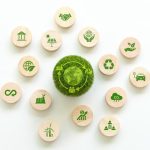News - Construction News
What is greenwashing and what can we do to combat it?

In a survey conducted in October 2022, more than three-quarters of British consumers said they felt that environmental claims were misleading. The poll, conducted by Sensu Insight, serves to illustrate the wider dangers of greenwashing.
What is greenwashing?
“Greenwashing is often a result of an organisation’s marketing department investing heavily in the appearance of being sustainable, rather than focusing efforts on a robust CSR strategy,” says Marcus Brew, managing director at UNTHA UK.
As part of his contributions to Agilité’s latest report, Conscious Construction: Building a Sustainable Supply Chain, Brew warns of the dangers of intentionally misleading the public. He cites the Corporate Finance Institute’s definition, which is:
“Greenwashing is when the management team within an organisation makes false, unsubstantiated, or outright misleading statements or claims about the sustainability of a product or a service, or even about business operations more broadly.”
The key signs of greenwashing
Brew also notes that being “green” in construction is only as good as the client’s brief. This includes making key decisions from the start of a project, not just looking at the eco-credentials at the end.
Other things to look out for include:
- Lack of proof – organisations may claim to be socially responsible but have little concrete evidence.
- False certifications – there are so many certifications and sustainability awards circulating that some may exaggerate or even fabricate credentials.
- Vague language – it’s easy to throw around terms like “circular economy” but what proof can companies provide to support this?
The challenges of corporate responsibility
Of course, not every organisation is out to deliberately mislead their customers. Much of the challenge comes from not knowing how to accurately measure or report our sustainability efforts. As such, it’s easier to make vague claims than provide facts and figures.
Compounded with ever-changing legislation and pressure from organisations like the UN, businesses may struggle to cope. The good news is that there are internationally recognised standards we can follow to assure a sustainable future.
How to avoid greenwashing
A great place to start is to look towards these globally accepted standards for measuring your business’ impact. The Global Reporting Initiative (GRI) sets out key standards to follow, including Universal Standards such as human rights, and sector-specific standards.
Likewise, the Sustainability Accounting Standards Board offers businesses and investors more information on the financial impacts of sustainability.
From a broader viewpoint, we can also follow the example of B Lab Benelux, who offer the following recommendations to avoid greenwashing:
1. State the sustainability benefits of your product or service clearly
“Promoting cleaner oceans” doesn’t cut it. Use concrete examples to explain the benefits, for instance, explain how switching to recycled plastic or investing in certain organisations has saved X tonnes from going to landfill.
2. Keep your claims up to date with facts
Every claim must be substantiated with a fact from a credible source, such as the UN. Keep in mind that legislation changes all the time, so update your policies and comms in line with this.
3. Be fair when comparing to other companies or products
Sustainability should never be used to attack other brands – we are all united in the same cause. If your product does use X% less, say so, but make sure you have the facts from both sides.
4. Use honest, specific language when talking about sustainability
Vague terminology will only alienate readers. “We’re passionate about the circular economy” tells us nothing. “We invest X% of our profits into biomass technologies” is clear and specific.
5. Make sure any certifications are genuine and not confusing
Research the best certifications relative to your industry, and make sure these are clearly communicated. A sustainability policy page, for example, can be used to outline the standards set by these awarding bodies.
Transform your supply chain with our new report
Insights on how to avoid greenwashing and measure your environmental impact are available now in our new report, Conscious Construction: Building a Sustainable Supply Chain. Download your free copy today.
If you would like to read more stories like this, then please click here
Related Articles
More News
- New National Housing Bank
4 Jul 25
Hundreds of thousands of extra homes will be delivered thanks to a bold new government-backed
- Homes England acquires Ripon Barracks from MOD
3 Jul 25
Homes England has acquired land at Ripon Barracks which will be developed into 1,300 new
- University joins forces to address critical construction and housebuilding skills gap
2 Jul 25
The University of Salford is collaborating with Cube Thinking to support Barratt Homes in bridging the shift in skills requirements.






